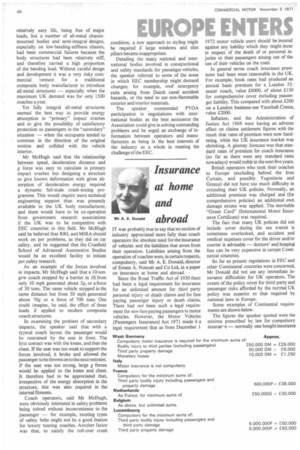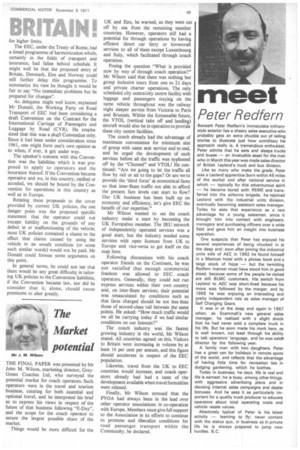Insurance at home and abroad
Page 50

Page 51

If you've noticed an error in this article please click here to report it so we can fix it.
IT was probably true to say that no section of industry appreciated more fully than coach operators the absolute need for the insurance of vehicles and the liabilities that arose from their operation. Liabilities arising from the operation of coaches were, in certain respects, compulsory, said Mr A. E. Donald, director of Ernest A. Notcutt and Co Ltd, in a paper on insurance at home and abroad.
Since the Road Traffic Act of 1930 there had been a legal requirement for insurance for an unlimited amount for third party personal injury or death claims and for fare paying passenger injury or death claims. There had not been such a legal requirement for non-fare paying passengers in motor vehicles. However, the Motor Vehicles (Passengers Insurance) Act 1971 made it a legal requirement that as from December 1 1972 motor vehicle users should be insured against any liability which they might incur in respect of the death of or personal injuries to their passengers arising out of the use of their vehicles on the road.
In general terms coach insurance premiums had been most reasonable in the UK. For example, book rates had produced an annual basic premium for a London 52seater coach, value £6000, of about ,E150 for comprehensive cover including passenger liability. This compared with about £200 on a London business-use Vauxhall Cresta, value £2000.
Inflation, and the Administration of Justice Act 1969 were having an adverse effect on claims settlement figures with the result that rates of premium were now hardening, while the UK insurance market was shrinking. A gloomy forecast was that standard rates of premium for coach insurance (so far as there were any standard rates nowadays) would treble in the next five years.
British operators who took their coaches to Europe (excluding behind the Iron Curtain, and possibly Yugoslavia and Greece) did not have too much difficulty in extending their UK policies. Normally, an additional premium was charged and (for comprehensive policies) an additional own damage excess was applied. The inevitable "Green Card" (International Motor Insurance Certificate) was required.
The fact that many UK policies did not include cover during the sea transit is sometimes overlooked, and accident and medical expenses cover for the driver and/or courier is advisable — doctors' and hospital fees can be very expensive in certain Continental countries.
So far as present regulations in EEC and other Continental countries were concerned, Mr Donald did not see any immediate insurance difficulties for UK operators. The extent of the policy cover for third party and passenger risks afforded by the normal UK policy was superior to that required by national laws in Europe.
Some examples of Continental requirements are shown below.
The figures the speaker quoted were the minima prescribed by law for compulsory insurar -e — normally one bought insurance for higher limits.
The EEC, under the Treaty of Rome, had a timed programme of harmonization which, certainly in the fields of transport and insurance, had fallen behind schedule. It might well be that the proposed entry of Britain, Denmark, Eire and Norway could still further delay this programme. To summarize his view he thought it would be fair to say "No immediate problems but be prepared for changes".
As delegates might well know, explained Mr Donald, the Working Party on Road Transport of EEC had been considering a draft Convention on the Contract for the International Carriage of Passengers and Luggage by Road (CVR). He emphasized that this was a draft Convention only. Since it had been under consideration since 1961, one might form one's own opinion as to when, if ever, it got under way.
The speaker's concern with this Convention was the liabilities which it was proposed to apply to operators and the insurance thereof. If the Convention became operative and we, in this country, ratified or acceded, we should be bound by the Convention for operations in this country as well as in Europe.
Relating these proposals to the cover provided by current UK policies, the one danger point was the proposed specific statement that the operator could not escape liability on the grounds of any defect in or malfunctioning of the vehicle; most UK policies contained a clause to the effect that claims caused by using the vehicle in an unsafe condition (or some such similar words) would not be paid. Mr Donald could foresee some arguments on this point.
In general terms, he could not see that there would be any great difficulty in tailoring UK policies to the Convention liabilities, if the Convention became law, nor did he consider that it, alone, should cause premiums to alter greatly.




































































































































































